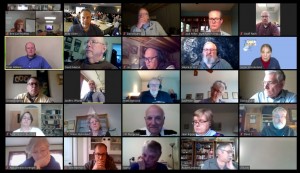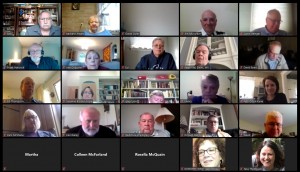 Originally scheduled to be held in Lewisburg, PA, the Synod of the Trinity’s annual Commission on Ministry/Commission on Preparation for Ministry (COM-CPM) gathering in 2020 was transformed into six workshops held virtually during the same scheduled two days in late April. The sessions dealt with challenges affecting many presbyteries, from changes in pastoral roles to how seminarians are different today than in years past.
Originally scheduled to be held in Lewisburg, PA, the Synod of the Trinity’s annual Commission on Ministry/Commission on Preparation for Ministry (COM-CPM) gathering in 2020 was transformed into six workshops held virtually during the same scheduled two days in late April. The sessions dealt with challenges affecting many presbyteries, from changes in pastoral roles to how seminarians are different today than in years past.
An estimated 80 people (which is 20-plus more than normally turn out for this gathering) attended the six online workshops, which were led by leaders from around the Synod region. Below is a brief recap of the sessions with links to some of the resources that were shared during the talks.
A Future with Hope: A Workshop on Discernment and Moving Congregations from Full-Time to Part-Time Pastorates
The Rev. Leslie Mott, an interim minister currently serving in Middletown, NY, developed a year-long process for her session to discern whether to have their pastor go from full-time to part-time. Leslie has gone through this change as a pastor and listed some crucial findings:
- that it is a “bottom up” as well as a “top down” process
- to expect resistance and slow results as well as miracles of new life, shared ministry and increased mission
- there will usually be a yearning for return to the old model, even with success
She shared her biggest mistake: “I thought I could transition into part-time, but I kept finding myself doing full-time work.”
Find a few resources from this discussion here:
- “Part-Time is Plenty — Thriving without full-time clergy” (G. Jeffrey MacDonald)
- Conversations About Expectations (Presbytery of Donegal)
- Pastor Time Expectations Worksheet (Presbytery of Donegal)
- Sample Goals Tracker (Presbytery of Donegal)
- Sample Weekly Project Tracker (Presbytery of Donegal)
The Role of CPM in an Ever-Changing World (Part I)
Rev. Brian Wallace, the associate minister for Pittsburgh Presbytery, spoke about changes that are occurring in seminaries these days. He said the average seminarian today is less knowledgeable when it comes to Presbyterian polity, theology and practice. Further, more of them are an “ecclesiastical refugees,” meaning they grew up in a different tradition and for a number of reasons have found their way to the PCUSA. The average seminarian is also less geographically flexible because their spouse is most likely the breadwinner and tied to their job and current location.
The seminary environment is also changing. As enrollment in seminary declines, seminaries are taking a more ecumenical approach that is less distinctively Presbyterian. One of the outcomes of this is that seminaries are accepting a higher percentage of applicants than in the past. “This is not a negative,” Brian said of the above observable trends, “this is just a statement of what is.”
“We have no idea what the short-term or long-term impact of COVID-19 will be, but we can make some educated guesses,” Brian concluded. “If we’re looking at an economic downturn, we sometimes find that seminary enrollment goes up because the job market isn’t as good. People who have thought about ministry and contemplated it, suddenly see pursing it as a more appealing option. We may see (the number of applicants) go down as people’s finances are negatively impacted.”
The Role of CPM in an Ever-Changing World (Part II)
Brian continued his discussion by looking at things from the pastoral search committee’s point of view. “What are we evaluating for?” he asked. “Is this person suitable, fit and ready for ordained ministry?”
Referencing the Book of Order, Brian listed six traits that can’t be taught (wisdom, maturity of faith, leadership skills, compassionate spirit, honest repute and sound judgment), saying that a pastor needs these traits to be an effective minister, regardless of a person’s background, education and sense of call.
COVID-19: Pastoral Stress and Adaptation
Rev. Wally Fletcher, a Presbyterian clergyman from the Presbytery of Philadelphia and a certified psychoanalyst and pastoral counselor, described five types of stress (personal, secondary, systemic, moral and adaptive) that significantly impact clergy and lay ministers during the COVID-19 epidemic. He emphasized the importance of ministers taking regular inventory and distinguishing among specific types of stress in order to deal with them most adaptively. He made special note of the increase of moral and adaptive stress as a result of this crisis.
The presenter also shared results of a small survey of 18 clergy and lay ministers that focused on what they are experiencing as most distressing, most energizing or positive, and most helpful with respect to the stresses of COVID-19. He described 12 overarching themes that emerged from the respondent’s comments and drew implications for COM’S and CPM’s in their ministries to ministers under their care.
 So, the Book of Order Walks into the Verizon Store
So, the Book of Order Walks into the Verizon Store
Many churches are used to “the presbytery” showing up to provide “one size fits all” mandates for calling the next pastor and other functions. Rev. Dr. Erin Cox-Holmes, the executive presbyter at the Presbytery of Donegal, related to the many options a person has when buying a smartphone (model, memory size, color, etc.) to the latitude and flexibility that actually is available in the Book of Order. The church, too, has a variety of pastoral options, from an installed full-time pastor to a transitional pastor to a pulpit-supply pastor. This requires church leadership and presbyteries to stretch how they function and apply the Book of Order.
“This thing of latitude and options is just going to get more and more stretched as we walk through the current pandemic and we see where that leads us into our future,” Erin said. COMs and CPMs need to develop their values for discernment as well as the “how to” provisions for exercising flexibility.
“Discerning what latitude to exercise requires development of the principles/values that will guide you,” Erin added. “It requires a team with the strength to say ‘yes’ sometimes, and ‘no’ other times – in other words to make decisions contextually.”
Board of Pensions Update: New Pastors’ Choice Plan
According to the Rev. Dr. Doug Portz, a senior church consultant for the Board of Pensions whose coverage area includes the Synod of the Trinity region (except for the Presbyteries of Donegal and Philadelphia), the Board will be adding two new options to the Benefits Plan in 2021. A “Temporary Disability Plan” and a “Long-Term Disability Plan” will be available to participants when benefit selection is available in the fall.
In addition to the Pastor’s Participation Package (e.g. for those ministers installed or offered this by the church to a minister of Word and Sacrament who works 20 hours/week or more), there will be a second offering for ministers called “Minister’s Choice,” which includes everything offered in the Pastor’s Participation Package except medical coverage. The cost of Minister’s Choice will be 10 percent of effective salary. Go to our website pensions.org for more details.
The Temporary Disability Plan will kick in on the 15th day a pastor is on disability, with the Board covering 60 percent of that person’s salary for up to 90 days. This will help the pastor receive her/his full salary during the time they are not working – or, if the church is already covering the full salary, allows it to use those funds to hire a temporary supply pastor.
Anyone with questions is encouraged to contact Doug (dportz@pensions.org) or Martha Reisner (mreisner@pensions.org), who oversees the Presbyteries of Donegal and Philadelphia.
